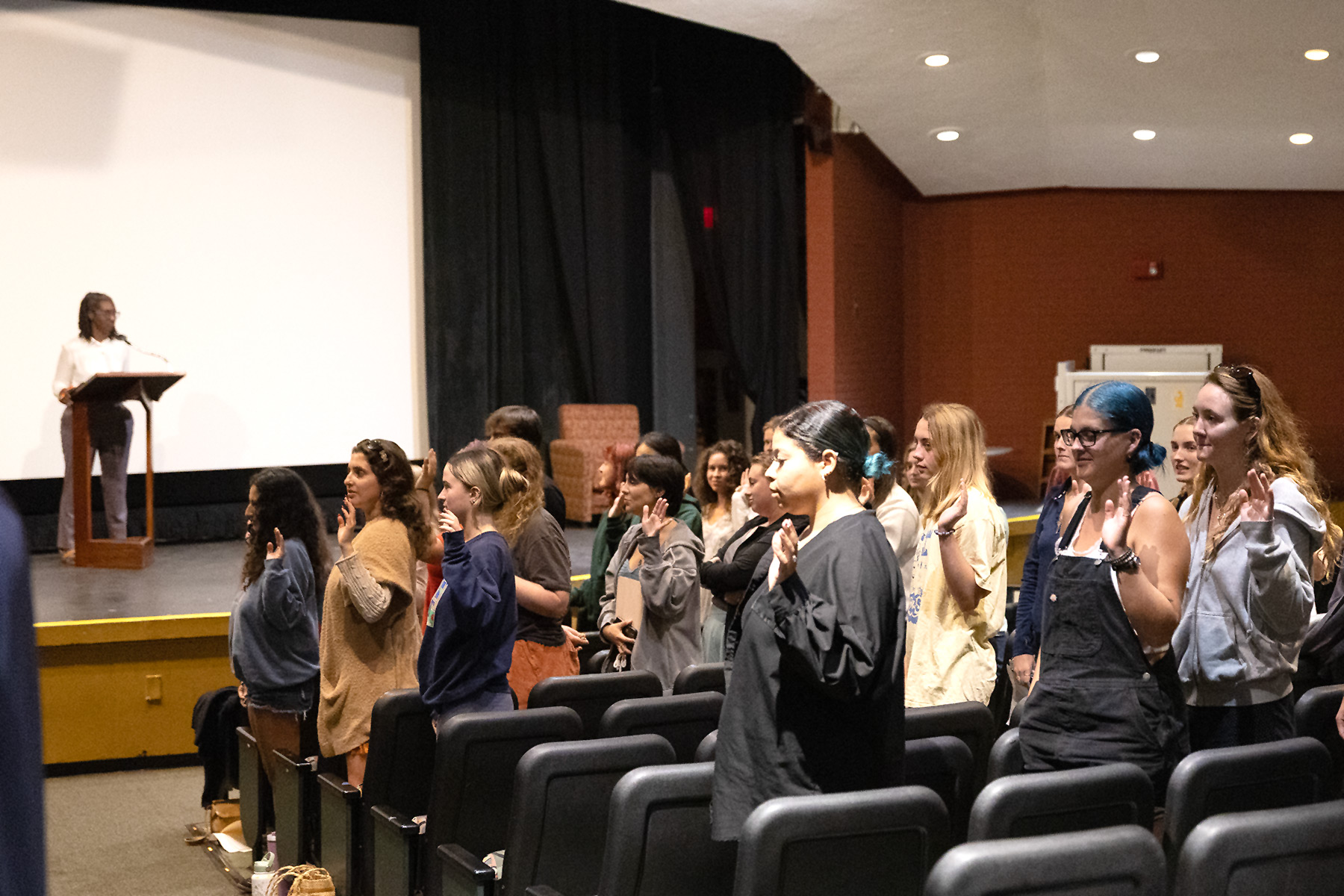“I try to live out love” is the motto of Eckerd College alumna LaRuby May ’97, J.D.
May returned to Eckerd to lead “Comfortable with Uncomfortable: The Start of a Rebellion” on April 1 in the Dan and Mary Miller Auditorium. By discussing her experiences as an Eckerd student, sharing stories about the workplace and referencing activist Fannie Lou Hamer, May explained how we can and should grow to become comfortable with the uncomfortable and fight for justice.
“Some of you guys make it easy for me to live out love, and some folks make it harder,” she said.
May first wanted to cover a few “housekeeping” talking points to give context to who she is and why this conversation is important. She asked the audience to stand up, raise a hand, face a certain direction and sit down.
After the audience complied, she said, “I am, by definition, a leader … so that hopefully gives you my qualifications.” Then laughter filled the room.
Next, she gave more context to herself, because where we’re from and our lived experiences shape who we are. Both her mother and father drank from Black-only water fountains, while today she can purchase buildings her father wouldn’t have been allowed to walk in, she said.
She continued to provide examples of her familial past but clarified, “I am not a statistic. I don’t like statistics, but I understand the reality that sometimes speaking to you in statistics is helpful.”
And though she has earned more money than her parents could have ever imagined, she said she has cried many of the same tears they did.
On May’s first day at Eckerd as a student in the ’90s, she set up her dorm room and met her roommate and roommate’s father. He didn’t want his daughter rooming with a Black student, May said. He even went to Housing to try to have the room switched. Her roommate decided, though, to room with May after all, and they became friends over the years.
How you use your privilege determines the type of person you are, May said, such as standing up for others and growing comfortable with an uncomfortable situation, as her roommate did.
“Everyone in this room is privileged,” whether it’s because of your zip code, your parents paying for your education or never having faced abuse as a child, she said. Fundamentally, everyone in this room is privileged “because they’re on a campus of higher education,” she explained.
“You have an obligation to use that privilege”—for good.
By sharing her stories, May tried to motivate the audience but not inspire them. If she inspired students, she believes they might go write a paper about rebellion or justice and then it would be over with, she said. If she motivates people, however, they’ll “move to change.”
“I want to motivate you to know that it’s okay to be different and to use your privilege … I want to challenge you to think of being a rebel or leading a rebellion as something positive,” she said, after noting that rebellions are sometimes viewed as negative and may center around violence, when that doesn’t have to be the case.
Rebellions, at their core, are the challenges of power, she clarified.
She encouraged students to challenge authority and norms, even in seemingly small ways. She had visited an Eckerd class earlier that day, where the topic of discussion had been what democracy and justice are. Most people believe that when people receive justice, they receive what they deserve, she said. Her challenge to this definition regards using our personal moral compass to determine what people deserve.
“Slave masters believe that Black folk deserve to be slaves, right? Male elected leaders in our country believe that women deserve the decisions about their bodies to be made by them [the males], right?”
Her examples showed how guidance from a moral compass doesn’t necessarily lead to what’s right.
May also said that rebellions tend to be a collective of people, but “it only takes one person to rebel.” There are many types of rebellions, she pointed out, and yours depends on your comfortability, which depends on how strong you are in facing uncomfortableness. Like with anything, you have to practice to get better at it.
Sometimes, feeling uncomfortable is rooted in how you were raised or in fear of what others might think. She encouraged white audience members to think about if they ever had a person of color at their dinner table growing up or if they’d now be comfortable taking their partner home to meet the family if their partner were a person of color.
“Maybe you practice that uncomfortability by inviting [to dinner with you] somebody that doesn’t look like you or has a different mobility or is LGBT,” she said. “You start practicing and building up the strength around being uncomfortable.” Later, she compared this exercise to strengthening a muscle through a physical workout.
At the end of her discussion, she left time for a Q&A session, where students asked about avoiding white saviorism and admitted that in the past they’d been too uncomfortable to say something when they should have.
She thanked them for their insightful questions and honesty and continued encouraging them to work that muscle to grow comfortable with the uncomfortable—reminding them: If you exercise your comfortability muscle in the wrong way, you may injure yourself and others. If you don’t exercise the muscle at all, you will lose your strength.














